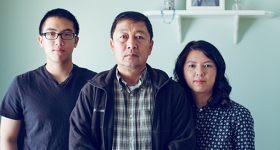For months, I’ve been sitting in front of my laptop with Netflix and Hulu open, scrolling through thought pieces, trying to resolve my conflicting feelings about Eddie Huang, Fresh off the Boat, allyship, and Asian American representation in relationship to intersectional feminism and identity. Like anyone who grew up on TV and the Internet, I look to shows and films for reflections of life that bears some resemblance to mine. My older brother and I grew up as second-generation children of Filipino immigrant parents in the suburbs of San Francisco, where Asian families abounded. In his memoir, Huang describes his childhood in suburban Florida and a constant tension between white and black cultures. The choices he had to make between the two as an Asian American were so familiar to me: I watched my brother come of age in the nineties. When he picked me up from school, I feigned disgust and covered my ears as he blasted Radiohead and A Tribe Called Quest. As a teenager, I rummaged through his CD collection, co-opting the same records I’d once pretended to hate. When he was a few dollars short of affording the latest pair of Jordans, I let him break open my Lamb Chop piggy bank and take from my meager savings. His coming-of-age signifiers contributed hugely to the formation of my angst-ridden girlhood. Inevitably my path diverged from his: I became interested in feminism, was given the very unsavory nickname of “resident feminazi” at my public high school, and in college went on to study gender and race theory.
We live in what some might claim to be the Golden Age of Asian American representation on television. The airing of Fresh off the Boat and Dr. Ken within the same season marks the first time that two network television shows’ main casts include Asian American families. ABC, NBC, CBS, and Fox boast Asian series regulars and recurring cast in numbers between 10 and 22. Fresh off the Boat in particular has been a revealing case study on representation and identity politics in media. The second season began with Eddie Huang’s departure as narrator of the show. He called out NBC for turning his raucous memoir into a “cornstarch sitcom,” and referred to executive producer Melvin Mar as an “Uncle Chan.” During an interview with Bill Maher, the chef was asked how he related to hip hop. Huang replied, “I feel like Asian men have been emasculated so much in America that we’re basically treated like black women. So I related a lot to Tupac, Tupacalypse, Me against the World, and when I sit on OKCupid, I’m just like no want wants to talk to me either…”
I was rooting for Huang to be a conduit for Asian American representation. Raucous as he is, I wanted an Asian American pop culture figure nestled somewhere in our country’s polarized identity politics, who understood the state of in-betweenness many of us feel in today’s galvanizing climate of activism and social justice. His show (and others within the same canon) proved to be a disappointing, sanitized version of what his memoir promised. It was salt in the wound when he imploded: Prevalent black feminists on Twitter responded to Huang’s statements, resulting in a back-and-forth in which Huang was dismissive, sexist, and, frankly, gross. Mia McKenzie of Black Girl Dangerous summarized her exchange with Huang: “Emasculated Asian man appropriates hip hop and has no respect for black women.”
For those who study race and feminism through an Asian American lens and aim to be better allies, McKenzie’s words are a hard pill to swallow. The term “intersectional feminism” has made the rounds in pop culture analysis, particularly in white feminists’ dismissal and exclusion of black feminists, whose experiences of sexism and racism cannot be disentangled in their lived experiences. Scholar Kimberle Crenshaw coined the term:
The view that women experience oppression in varying configurations and in varying degrees of intensity. Cultural patterns of oppression are not only interrelated, but are bound together and influenced by the intersectional systems of society. Examples of this include race, gender, class, ability, and ethnicity.
If we need feminism to be intersectional, we might understand privilege as operating intersectionally, too. McKenzie’s Tweet points to a painful history: Since the first representations of black and Asian people in media, Asian men have been depicted as the effeminate, asexual model minority against depictions of hypersexual, deviant black men. Today, racial and sexual stereotypes exist in evolved modes, of which Huang is all too aware as an Asian man. But in his haphazard comparison of Asian men and black women’s experiences of exclusion and stigmatization, he didn’t explain the oppressive mechanisms that privilege whiteness and create sexual and racial stigmas in the first place. The ensuing dispute further proved a total failure at the kind of allyship required when one hails himself an Asian American “representative” who has appropriated black culture as the foundation of the outsider persona he’s branded. The oppression he’s experienced as an Asian man does not excuse the racialized sexism he inflicted on black women.
FOB engages with the difficulties of intergenerational relationships and cross-cultural conflict, but, like any primetime network show about a middle-class, nuclear family, presents these stories with tidy endings. Lingering questions are swept away before the next episode. The edgiest episode of the series is its pilot, in which young Eddie is rejected by a group of white boys at his new school, then goes head to head with Walter, a black student, for the bottom spot in the racial totem pole. Walter tells Eddie, “You’re at the bottom now. It’s my turn, chink.” The episode ends with Eddie’s parents defending him from the principal. The next time we see Walter several episodes later, he and Eddie are friends (along with the white kids); no mention is made of their altercation. Instead of examining the complex relationship between two young boys who experience oppression and privilege in different ways and their eventual friendship (even allyship), the show uses racial rivalry as a plot device to demonstrate the Huang family’s bond.
On the other end of the TV spectrum, I’ve engaged in euphoric binge watching of Aziz Ansari and Alan Yang’s Master of None. Like FOB, MON is based on the lives of Asian American men and explores their relationships with parents, friends, colleagues, and romantic interests, but Netflix provided Ansari and Yang a format to freely explore identity and representation without filter. As Arthur Chu points out, MON’s strength lies in its embrace of imperfection -- the chaos of real life leaves no room for tidy endings or grand statements on race or gender. Instead, the show portrays the characters’ experiences of identity and privilege as an ongoing, tragic, hilarious process. Every episode dealing with complex issues like the gap between immigrant parents and second-generation children, gender equality, and race and representation in media ends with a massive dose of irony.
One example is in the “feminism episode” of the series. Months ago, Ansari went on Letterman and proclaimed himself a feminist, receiving enthusiastic social media praise. He seems to reflect on this in “Ladies and Gentleman”: His character, Dev, is made aware of the everyday forms of sexism that his girlfriend, friends, and coworkers experience. He begins a righteous male feminist crusade -- performing a citizens’ arrest on a subway masturbator and educating his commercial director about women’s underrepresentation on TV. By the end of the episode, Dev feels weirdly sorry for the masturbator, and he loses his job as one of two men of color in the commercial, as the director puts the women actors at the forefront. Dev sees that it’s easy to be a male feminist when all he has to do is repeat feminist trivia—77 cents on the dollar, governmental regulation of women’s bodies, “You smile more? Nuh uh, him smile less!” But when enacting feminist goals means taking away from him, he’s less enthusiastic. Men who proudly proclaim themselves as feminists often expect praise, when actually engaging with feminism means questioning the processes that construct masculinity and the privileges it grants them. It's not enough to say that men and women are equal in order to dismantle patriarchy; rather, there needs to be an actual redistribution of wealth -- economic and social -- which may mean men lose material and symbolic privilege. Dev may be a feminist and an ally, but he’s also out of a job.
To Chu’s point, I’d like to add that MON’s success as a show that presents relevant issues and three-dimensional, Asian American characters in relatable situations, lies in its creators’ self-awareness of their own insufficiencies. An ally isn’t someone who claims to completely understand what another marginalized group is going through, but rather understands the limits of allyship and can admit one's own benefits from privilege. MON is not without flaws: Ansari has responded to criticism about Dev only dating white women and the lack of Asian American women. He has yet to discuss the trope of white women as the sexual and dating pinnacle for POC men, and the black lesbian character, Denise, while cool as hell, has yet to receive a worthy storyline. But I see Master of None as an earnest attempt to look at representation in American television today through an Asian American, intersectional lens, that is simultaneously poignant, sad, funny, nuanced, and diverse.
Alyssa Manansala is an editorial associate to Hyphen. She has worked as an editor and writer in New York, Paris, Kathmandu, and San Francisco, and is interested in race, gender, representation, and critical theory. Email her at alyssa.manansala [at] hyphenmagazine.com.









Comments